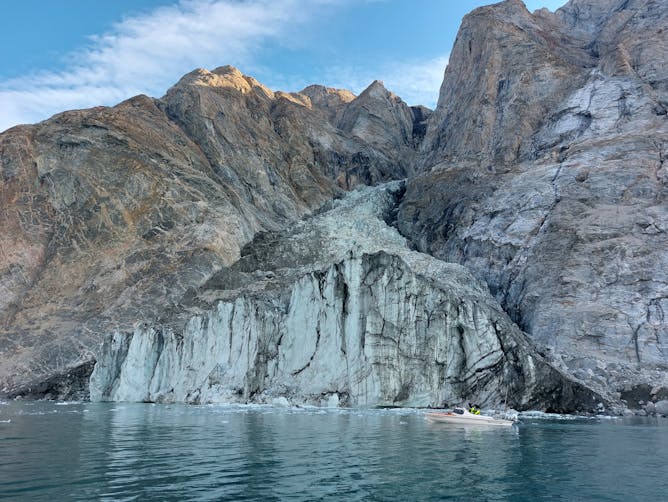|
Looking up at the night sky can instil a sense of awe at the enormity of the universe. The science of cosmology seeks to understand the vast expanse of stars and galaxies that’s a source of endless fascination for humanity. Cosmology tackles some of the biggest questions in science, such as how we got from the Big Bang to the complex universe we see today. But answering those questions is far from straightforward.
Disagreement over key issues has led some observers to call cosmology a field in crisis. Over the next few weeks, our experts will delve into longstanding debates, drawing on the latest research and ideas. They’ll tackle topics such as dark energy, the expansion rate of the universe and a puzzle over the earliest galaxies seen by the James Webb Space Telescope.
But the uncertainties may also be opportunities to make scientific breakthroughs. Next generation telescopes due to come online in coming years could make valuable measurements that open up a whole new window on the cosmos.
Back on Earth, a melting glacier in Greenland caused a skyscraper-sized tsunami that vibrated through the entire planet in September 2023. Yet because of its remote location, no one saw it. Scientists had to reconstruct the event using satellite imagery, seismic data and simulations.
Meanwhile, care homes in England are warning that they may have to close due to changes in immigration policy. The number of care worker visas granted to people to come and work in the UK has seen recent dramatic falls. The effect has been dire for social care, which relies heavily on recruitment from overseas.
|

|
Paul Rincon
Commissioning Editor, Science, Technology and Business
|
|

Andreea Font, Liverpool John Moores University
Right now, it looks like the cosmology is at a tipping point.
|

Stephen Hicks, UCL; Kristian Svennevig, Geological Survey of Denmark and Greenland
This tsunami, triggered by a melting glacier in Greenland, is a sign of things to come.
|

Majella Kilkey, University of Sheffield
Projections suggest that an extra 480,000 jobs will be needed in the care sector by 2035.
|
Science + Technology
|
-
Miriam Frankel, The Conversation; Paul Rincon, The Conversation
A new series delves into the big questions surrounding the nature of our universe.
-
Jason Gilchrist, Edinburgh Napier University
The Jurassic pterosaur’s size was estimated from only its finger bone.
|
|
World
|
-
Rachael Jolley, The Conversation
A round-up of all the latest stories relating to the Ukraine war.
-
Stefan Wolff, University of Birmingham
Russian attempts to use the Arctic as a military resource for the war are starting to be diminished by more effective western pushback.
-
Jennifer Mathers, Aberystwyth University
Putin could have used the Ukraine offensive into Kursk as an excuse to ramp up conscription.
|
|
Politics + Society
|
-
Janine Coates, Loughborough University; Lesley Sharpe, University of Lincoln
Too often, disabled children are not afforded the same opportunities as their peers
|
|
Health
|
-
Rachel Churm, Swansea University
A combination of strength training and endurance exercise was shown to be the most beneficial for post-menopausal women.
|
|
Arts + Culture
|
-
Barry Langford, Royal Holloway University of London
Driven by a powerhouse performance from a jacked-up McAvoy, Speak No Evil is certainly entertaining.
-
Finola Kerrigan, University of Birmingham
The practice of celebrity endorsement has been around since the 19th century, as organisations recognised the value of celebrity notoriety in promoting their brands.
-
Jacqui Turner, University of Reading
A thornback was seen as an unattractive and unloveable woman who had yet to find a man to save her from her predicament. We don’t need to bring the term back
|
|
Business + Economy
|
-
Igor Goncharov, Lancaster University; Vasso Ioannidou, City, University of London
Central bank independence is important for economic stability – and the money in everyone’s pocket.
|
|
Environment
|
-
Jessica McCoy, Northumbria University, Newcastle; Matthew Pound, Northumbria University, Newcastle
Reconstructions suggest that rainfall rates may exceed 1.4m per year as a new norm. This would have massive implications for the future of food security in the UK and Ireland.
|
|
|
|
| |
| |
| |

|
| |
| |
| |
|
|
15 September 2024
•
Egham
|

|
16 - 17 September 2024
•
Manchester
|

|
23 - 24 September 2024
•
Birmingham
|

|
|
|

|
|
|
|
| |
| |
| |
| |
| |
|
|